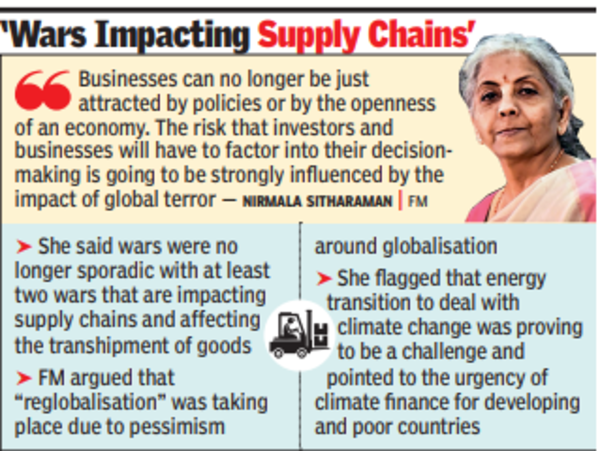[ad_1]
“Businesses can no longer be just attracted by policies or by the openness of an economy. The risk that investors and businesses will have to factor into their decision-making is going to be strongly influenced by the impact of global terror,” she said at the Kautilya Economic Conclave.
While businesses would often factor in terror-related risks while investing in South Asia or some other parts of the world, in recent years several other regions, be it the US or Europe, have been prone to terror attacks.
The minister’s comments on war impacting supply chains come days after the latest conflict in West Asia, which has so far not caused too much disruption, unlike the Russia-Ukraine conflict, which affected supply of oil and natural gas, wheat, sunflower oil and several other commodities.
The FM said wars were no longer sporadic with at least two wars that are impacting supply chains and affecting the transhipment of goods. Arguing that “reglobalisation” was taking place due to pessimism around globalisation, the minister said that the developments had led to concerns over food security. “Global food security has to be thought of. It is ironic to be thinking about it in the 21st century. If you depend on global sourcing, you will have to factor in global risks,” she said, while flagging fertiliser and fuel as other areas of concern.
The FM also said that energy transition to deal with climate change was proving to be a challenge and pointed to the urgency of climate finance for developing and poor countries, an area which had been dealt with by the independent expert group set up by India during its G20 presidency.

She said India used its own resources to fulfil its Nationally Determined Commitments as outlined in the Paris Agreement. “Consider a country like India, where developmental goals and aspirations are being achieved at an unprecedented pace and where a significant portion of the population still requires support. The question arises: Where will the necessary funds come from?”
The FM also said that the government is looking at ways to reduce debt, while maintaining that the Centre remains focused on responsible spending, shunning temptations of fiscal profligacy. “We are conscious about the debt of the government today. Compared to many others it might not be as high as it is, but even there we are consciously looking at experiments in different parts of the world. Again, some of the data about some emerging market countries about how they are managing their debt is something which is actively in our minds in the ministry, and we are looking at ways in which we can bring down the overall debt,” she said.
[ad_2]
Source link
